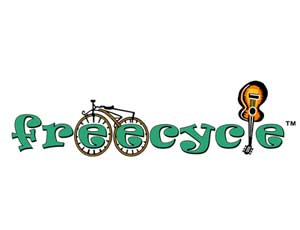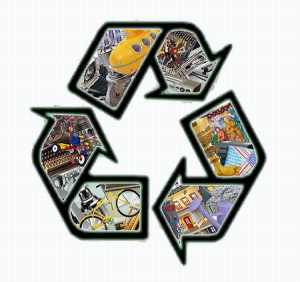» Freecycle
Freecycle – Making Your Junk Green

It is nearly always a hassle to dispose of large, unwanted objects. Sometimes it is easier to pile office equipment and old furniture in a corner rather than taking it to a disposal site. In 2009 Freecycle, a non-profit, grassroots movement which started in the United States, made its way to the United Kingdom in hopes of addressing overcrowded landfill and the inconvenience of unwanted possessions. The group requires people join a local network where they post advertisements for items which they no longer want or need, with the hope someone will take the items free of charge.
The Freecycle program now has hundreds of chapters within the United Kingdom. The greater London area alone has nearly 40 chapters specific to its burroughs. By visiting www.uk.freecycle.com you can navigate your way to your local chapter. The site will require you create a user name and password with no charge. From there you can start posting ads for your unwanted stuff or looking for free stuff. The exchange of items must be agreed upon by the giver and taker. These local groups are usually maintained by volunteers, including one volunteer moderator. Some moderators use yahoo.com to organize their local chapters; so in addition to a freecycle login you may also need to create a free Yahoo account, if you do not already have one. It has to be the greatest money saving website in the history of the Internet!
If the freecycle concept sounds familiar but the name does not, you may have heard of a similar United Kingdom based group, Freegle. Freegle groups started when the parent American organization did not allow enough autonomy for the members’ liking. Rather than continue with their organization using the freecycle banner, the group members and moderators began Freegle. A group in Brighton also created a similar group around the same time called GreenCycleSussex. All three groups may sound different, but their aim is the same- give your unwanted items away rather than take more landfill space. Between Freegle and Freecycle, the groups have easily over two million members with many more joining each day. You should not have much trouble finding an interested take for your junk.
 The non-profit now has charter groups in over 80 countries. Usually exchange between group members remains local, but in the future there may be a greater exchange of free items on a national and perhaps international scale. Of course most people around the world may not obtain the clutter some of us British, and not to mention Americans, collect, but the concept will undoubtedly have a beneficial result world wide. Helping spur the movement are for-profit companies such as the American based Waste Management Incorporated which frequently donates to the American Freecycle program. Once the program gains more momentum in the United Kingdom, local companies will likely join in donation.
The non-profit now has charter groups in over 80 countries. Usually exchange between group members remains local, but in the future there may be a greater exchange of free items on a national and perhaps international scale. Of course most people around the world may not obtain the clutter some of us British, and not to mention Americans, collect, but the concept will undoubtedly have a beneficial result world wide. Helping spur the movement are for-profit companies such as the American based Waste Management Incorporated which frequently donates to the American Freecycle program. Once the program gains more momentum in the United Kingdom, local companies will likely join in donation.
